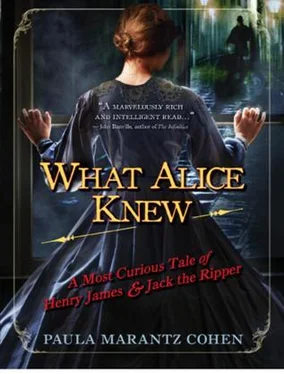“Oh no,” protested Emily. “You paint your subjects exactly as they are.”
“Yes.” Sargent nodded. “Only six inches taller and with good teeth.”
Alice laughed. “You have, in my opinion, come up with the perfect formula for success as a portraitist. If your subjects are impossibly old and ugly, you make them look like dowager empresses, and if they’re young and vacuous, like blushing roses. How, I wonder, would you paint me? Would you make me wise or beautiful?”
“I would not need to make you either.” Sargent laughed. “You are already both!” He had returned to his chair, although not before producing a farthing and a piece of candy, which he slipped to Archie before he left the room.
“I won’t argue with your flattering assessment of me,” said Alice, “especially since you might have leverage with my brothers. They tend to be skeptical of my wisdom, if not my beauty.”
“Oh, they’ll come around,” said Sargent, stretching out his legs and closing his eyes. “You’ll see to that. Now if you’ll excuse me, ladies, being in the presence of so much wisdom and beauty has tired me out. And since I’m sure you have a great deal you want to gossip about, I think I’ll take a nap.”
When Henry and William returned to Alice’s apartments that evening, Archie was on hand to take their coats. “If you’ll step this way, I’ll show you to the apartment of Madame James,” said the boy with an exaggerated bow.
William seemed nonplussed by this childish formality, but Henry, with a greater understanding of how custom and ritual served to uphold the social structure, responded with a grave nod. “We’re much obliged to you, young man.”
“Archie, get back here and stir the pot!” shouted Sally from the kitchen.
“If you’ll excuse me, sirs, I’m called to duty elsewhere,” explained the boy. “Milady’s chambers is through that door, if you’d be so good as to find your own way.” Having apparently suffered the ire of Sally already and not wanting to repeat the experience, he ducked out of sight.
Henry laughed after the boy left. “It’s a great thing to lift the lower classes.”
“I suppose,” said William doubtfully, “though I suspect it only teaches a more elaborate form of servitude. The whole system offends my ideal of democracy.”
“Your ideal of democracy would not work in this country. Your cutlery would be stolen and your daughter carried off before you had a chance to launch one of your progressive schools.”
“A rather cynical way of looking at things.”
“Not cynical; realistic. You speak continually about the importance of context. Well, context works in social settings as well. One doesn’t apply democratic ideals without an understanding of the history and customs of a people. Here, change happens incrementally, and giving the boy a uniform and a chance to stir the pot in Mayfair is a great leap forward from pilfering and worse in the East End.”
William did not argue.
When they entered Alice’s bedroom, their sister was sitting in her bed, munching on a piece of celery. “It’s supposed to be good for the digestion, only I hate it,” she grumbled, at which she threw the celery across the room, where Katherine, who had been sitting reading a newspaper, calmly picked it up.
“I hope your visit to the East End was productive,” continued Alice, as though throwing celery were a perfectly normal part of her everyday activity.
“I’m afraid we didn’t learn much,” said William, “though we had one intriguing interview with a woman who knew the second victim, Polly Nichols. She said that Polly used to visit a gentleman a few times a week in the area.”
“But isn’t that what such women do?”
William cleared his throat; his sister’s directness still embarrassed him. “Not insofar as Polly told our witness that she was being paid to do something else.”
“And what was that?”
“Unfortunately, we don’t know.”
Alice looked annoyed. “Then you ought to find out, hadn’t you?”
Before more could be said, Sally entered the room with a large casserole dish containing the oysters with mushrooms, and some time was spent ladling out portions.
As they were being served, Alice turned to Henry. “Did you write anything interesting this afternoon?” she asked politely.
“As a matter of fact,” said Henry, pleased to expound, “I have begun a new project, the dramatization of one of my works.”
William made a slight choking sound, and Alice shot him a look. “A play, how nice.” She nodded. They ate without speaking for a few moments, until finally, Alice broke the silence, speaking to William of what clearly interested her most. “I assume you spent your afternoon at Scotland Yard examining the letters. Did you bring them for me to look at?”
William put down his fork and took a sip of wine. As he did so, he touched his jacket pocket in a reflexive gesture.
“You have them!” exclaimed Alice. “They’ve let you borrow them!”
“I really don’t know what you’re talking about,” said William, bringing his napkin to his lips and opening his eyes in mock innocence.
“You see how he gives himself away?” Alice directed herself to Henry. “He can’t lie. He’s afraid he’ll go to hell if he does.”
Henry shook his head. “I don’t think that’s it. He tries to lie, except he’s bad at it. It’s why he could never write fiction—and doesn’t appreciate mine.”
“Enough!” interrupted William. “I admit I have the letters, or at least a few of them. Abberline’s men went through the lot and identified those they felt to be authentic. I’ve been given permission to examine them at my leisure. Obviously they’re confidential.”
“Phooey,” said Alice, waving her hand. “Let me see them!”
“I really can’t do that. The letters were released to me as a special consultant to the police commissioner.”
“And I am a special consultant to you ,” declared Alice, “and a highly sensitive one. If you don’t show me the letters, I’m sure to get a headache and have a fainting spell.”
William gave his sister a withering look. “That’s…beneath you!”
“No, it’s not!”
He paused and, still glaring at her, took an envelope out of his pocket and handed it over. There was silence for a few minutes as Alice perused the letters while Henry peered over her shoulder. There were a dozen or so assorted sheets, some on full pieces of vellum, some on scraps of paper or postcards.
“Why do you assume these are authentic?” Alice finally asked.
“It’s not a definitive assumption. There are a hundred or so letters received at Scotland Yard and the Central News Agency alleged to be from Jack the Ripper, and more come in each day. Abberline has confided that at times he wonders if any are genuine. But the experts he has employed believe that these, at least, have a claim to validity by virtue of their content and style.” He leaned forward, extracting a sheet from the group. “This one, for example, dated September 25 and postmarked September 27, was addressed to the Central News Agency, forwarded to Abberline, and not published until October 3.”
Alice took the letter from him. It read as follows:
Dear Boss
I keep on hearing the police
have caught me but they wont fix
me just yet. I have laughed when
they look so clever and talk about
being on the right track. That joke
about Leather Apron gave me real
fits. I am down on whores and
I shant quit ripping them till I
do get buckled. Grand work the last
Читать дальше












